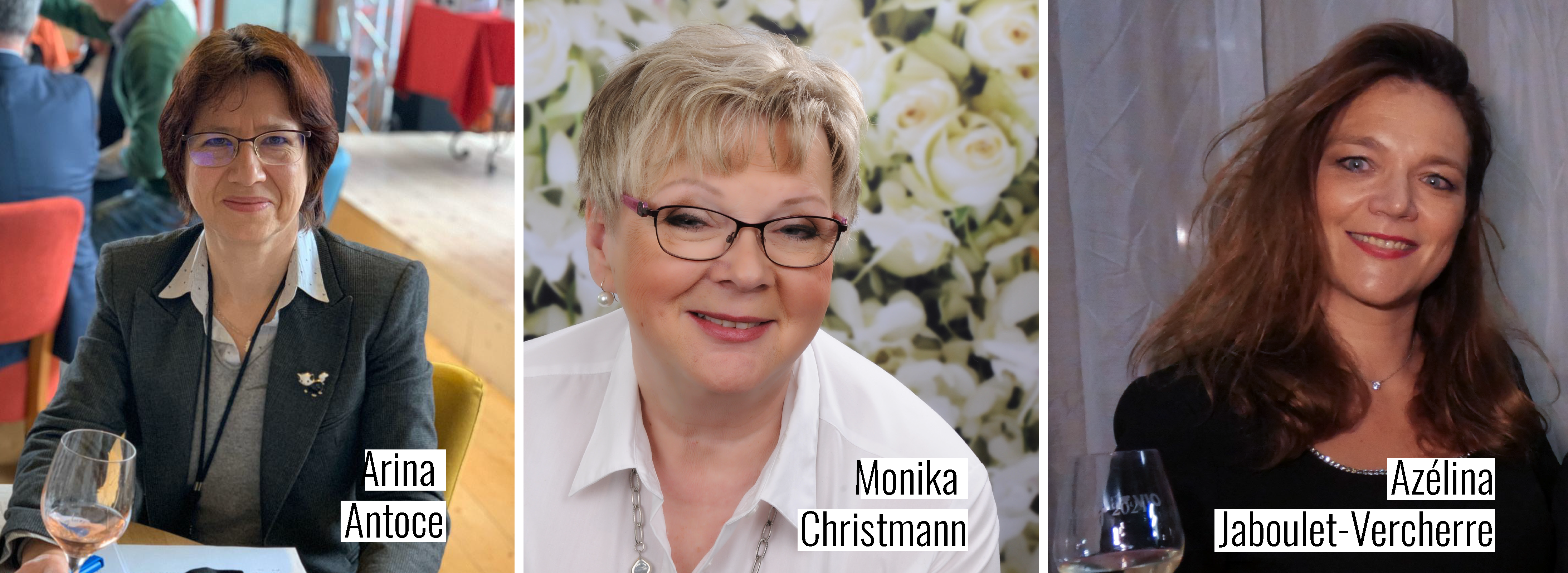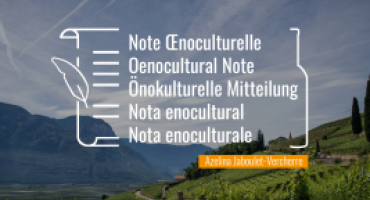As OIV commemorates its centennial on International Women's Day 2024, we turn the spotlight to women's role in the vine and wine sector.
This year the International Women's Day campaign theme is 'Inspire Inclusion'. This signifies commemorating diversity and empowerment across all realms, where we can include the wine sector.
On this occasion, along with its centenary celebrations the OIV asked three female personalities, whose contribution to the vine and wine sector and our organisation has been fundamental, to share their vision and personal stories.


“I think that things have definitely improved, but at the same time they are strangely… unchanged?”
Arina Antoce, Professor of Oenology, Romania
First, I know all women in the sector will agree with me when I say that we cannot imagine wine, as it is now, without the contribution of the OIV. It is a privilege to be part of the OIV during its anniversary (or “during its anniversary period”) and I wish the organisation all the best for many, many years to come.
When I started, some 30 years ago, getting a wine-related job in my country was hard. I was applying for the position of assistant professor in the university, which does not seem so physically demanding, right? Yet one of the interviewers told me directly that the job was “not for a woman”, because although it is mainly education, they still need to produce a batch of wine every autumn, for research purposes, so they would prefer a man instead … Of course, I insisted and got the job and then worked ever since together with my initially hesitant professor and in fact we made a great team. Eventually, I got his position when he retired… We still collaborate in the master's course that I now coordinate and in which I invite him to lecture. We have a good laugh when we recall that episode of long time ago.
I think that things have definitely improved, but at the same time they are strangely… unchanged? For example, finding success stories is not hard at all. We have women who are vineyard owners and winemakers, who, through hard work over the years, and maybe a bit of luck, have made a name for themselves in a man dominated world and are periodically courted by the mass media as some interesting examples of what women – perhaps slightly unexpectedly – can do, and can do well. They are the tip of the iceberg, though. Thousands of other women, who remain anonymous, actively contribute to, and find success in various supporting roles across the wine and vine industry. I wish that, somehow, all those women could make their voices heard more.
Perhaps there are some realistic factors for this situation. With so many other fields in which a woman can excel, it is simply a matter of choice. Viticulture and winemaking are not easy fields, the work is tough, with seasonal highly demanding tasks, locations are often far from big cities, so the profession requires a lot of dedication and sacrifices. One must be especially drawn to the field of wine, and when it happens it is often due to family ties or, occasionally, it happens just by hazard. And this is valid for both genders. But, instead of contemplating the numeric imbalance between the proportion of men and women in our field of activity, perhaps we should celebrate the capacity of women, in general, to fill any spot, and to reach any professional assignment, and to do a good job there – when they decide that is what they want to do. With technology continuously improving and thus decreasing the menace of hard physical work, more and more women feel confident to join the vine and wine sector.
For me, arriving at this stage and being able to enjoy working in the OIV has been a long string of happy circumstances. With a degree in biochemistry, getting this job in the university, becoming passionate about fermentation and wine chemistry, joining the Romanian Association of Authorised Winetasters, participating in national and then international contests – all these led to the present. It was a path full of unexpected opportunities and mostly right choices. I don’t think it would have been easier if I were a man, or that it was harder because I was a woman. And that is a good, encouraging thing.
I am honoured to be part of Romania's team of experts at the OIV. It helped me improve my courses for students, while also (hopefully) making a difference for the international wine sector. It is an organisation that places importance on the expertise and capacity of its Members, without any discrimination.
“I was chosen to take on the position as chair of the “Institute for Oenology” at Geisenheim University.
That created quite a scandal. 'A WOMAN' heading a technical Institute?”
Monika Christmann, OIV Honorary President
Hochschule Geisenheim University, Head of Institute for Oenology, Germany
In the eighties, when I was a bachelor student, studying “Beverage Technology” the number of female students was very low. That was also the case for the study course “Viticulture and Enology”. Most of the female students had a “wine background” due to family wineries. “Outsiders” were very rare. That did not change in the following Master`s program. Female Enologists were often offered a job in a Laboratory or in Marketing. That was also the case at the beginning of my career. “Technology was something for “Men”.
Already during my time as a Master Student and later as a PhD Student I did not accept this. I developed a new technique for the de-alcoholization of wine which was built in a commercial size and led to very good results. Of course, at that time I was considered to be “crazy”. Now this is one of the most important issues in winemaking due to climate change.
After some years working in a famous German Export Winery I moved to California and started working there. That was quite a difference. Female winemakers with no family winery in the back were not so “rare” as in Europe. This was also the case at the winery where I worked. After some years of gaining a lot of experience and after many training sessions in avoiding “discrimination”. I was chosen to take on the position as chair of the “Institute for Oenology” at Geisenheim University. That created quite a scandal. “A WOMAN” heading a technical Institute? After all my training in California I thought “Welcome back to the real world”. But this changed very rapidly.
I think it was very helpful that I never accepted limits which were set for me by other people. You need to recognise and accept limits by yourself.
Being very interested in history I admire women who already in the Middle Ages were going beyond what was expected and tolerated for women. So, Hildegard of Bingen or Leonore of Aquitaine are some very great examples.
These days the vitivinicultural sector has changed dramatically. When I look at my students, I can see that the number of female students has extremely increased. Technical lectures or topics are not only interesting for male students. This is a very good development.
Also, in the OIV female presidents in various positions are highly accepted and respected. They can be a “role model” for the new following generation of females in the vitivinicultural sector.
While in Europe the wine sector was more conservative compared to the new world, I think this has now completely changed. Winemaking is more globalised, and we see a lot of exchange between the different wine growing areas in the world also due to winemakers working internationally.
“The survival of the fittest!”
Azélina Jaboulet-Vercherre
Wine Historian, President of the OIV Award Jury, France
Reflecting upon the idea of gender parity in my childhood, it did not exist. A phrase comes to my mind: the survival of the fittest!
Speaking one’s mind was not a right that a girl, or even a woman, had. Which did not mean we would not do it. But it came at a social cost. And yet, the reward of speaking one’s mind was worthwhile. The men in my family were not ready to leave any aspect of the production or business of wine to women. I suspect that’s why I moved to the more cerebral aspects of wine, winemaking, and wine drinking, and became a historian, although I would like to think that passion and sheer intellectual curiosity were what drove me.
And now, seeing some women thrive as business owners or partners in the wine world undoubtedly attests to changes in men’s attitude. At least among some, women’s differences are now celebrated, and men and women are thought to be complementary, neither superior nor inferior to one another.
But change is slow. The agricultural world is, by definition, rural. And as such, it is necessary, if also frustrating, to operate within the framework of the “longue durée,” a concept dear to some of my intellectual influences, such as Fernand Braudel and Jacques Le Goff.
In fact, there have always been strong women, and to say that the emancipation movement is recent occludes these women’s endeavors. Hildegard of Bingen (1098-1179) was an abbess, a woman of letters, a doctor, a prophetess and a musician. There are many facets to her originality, including her demonstration that being a woman was no obstacle to receiving the recognition, and even the esteem, of the great and good among her contemporaries (Bernard of Clairvaux; Pope Eugene III). She was then largely overlooked until the twentieth century (mirroring the women’s liberation movement), and in recent years the frequency with which she is offered as an example of a strong woman, suggests the rarity of her kind. It was not until October 7th, 20124, that the Vatican bestowed upon her the title of ‘Doctor of the Church’. This late acknowledgement of Hildegard’s spiritual, theological, musical, and political prowess speaks for itself. While married only to the Church, she illustrates the saying “behind every great man, there is a great woman.” But more than a woman, she was a powerful mind by any standard, and acceptance of that fact transcends the current debate.
